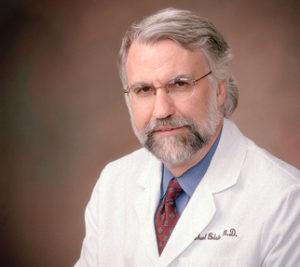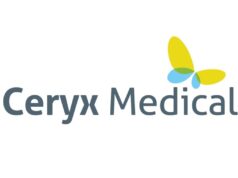
The current need for new preventative therapies of atrial fibrillation in chronic heart failure patients—with fewer side effects than currently available treatment strategies—has led ARCA biopharma to develop bucindolol hydrochloride (Gencaro), a pharmacologically unique beta-blocker and mild vasodilator. Cardiac Rhythm News speaks to Michael Bristow (University of Colorado AMC/CVI/BioFrontiers Institute, Aurora and Boulder, USA), founder and CEO of ARCA biopharma, in detail about this new genetically-targeted therapy.
Bucindolol hydrochloride is being studied in GENETIC-AF, a genetically-targeted phase 2B/phase 3 multicentre, randomised clinical trial for prevention of atrial fibrillation in patients with heart failure and reduced left ventricular ejection fraction.
What are the current limitations of preventing/treating atrial fibrillation in patients with heart failure?
Atrial fibrillation is considered an epidemic cardiovascular disease based on the pace of increase in incidence in the USA and industrialised countries. It has recently been estimated that the global/world-wide burden of atrial fibrillation is approximately 33 million individuals. The goals of current medical therapy for atrial fibrillation are to maintain sinus rhythm or to control ventricular rate response in patients who cannot maintain sinus rhythm, and to provide adequate anticoagulation in an effort to minimise patient symptoms and avoid the risk of complications, the most important of which is stroke. Current treatments include pharmacologic and device interventions. The currently approved therapies for the treatment or prevention of atrial fibrillation have certain disadvantages in patients with heart failure with reduced left ventricular ejection fraction, or HFrEF, such as toxic or cardiovascular adverse effects, and most of the approved drugs for AF prevention are contraindicated or have warnings in their prescribing information for heart failure patients.
Could you expand on the disadvantages of the current methods of treatment for this patient population?
As far as we can determine, there are no FDA approved therapies for preventing atrial fibrillation in HFrEF patients. As I just mentioned, therapies approved for treating atrial fibrillation have some limitations or disadvantages in HFrEF patients. Dofetilide (Tikosyn), which is sometimes used in this setting, requires in-hospital QT interval monitoring on dose initiation to reduce the number of patients at risk for Torsades de pointes. We believe there is an unmet medical need for new AF treatments that have fewer side effects than currently available therapies and are more effective, particularly in HFrEF patients.
With the development of Gencaro (bucindolol hydrochloride) you are proposing the first genetically-targeted treatment strategy for these patients; could you explain the mechanism of action of this therapy?
Gencaro is a pharmacologically unique beta-blocker and mild vasodilator. In addition to competitive antagonism for both beta-1 and beta-2 adrenergic receptors, which is found with other beta-blockers, Gencaro uniquely is also sympatholytic and acts as an inverse agonist on the human myocardial 389 Arginine variant of the beta-1 receptor, meaning it promotes a shift in the equilibrium from a constitutively active to an inactive state. We believe both these properties, unique to bucindolol among beta-blockers currently approved for treating HFrEF patients, explain the enhanced heart failure and arrhythmia endpoint responses of HFrEF patients who have an ADRB1 Arg389Arg genotype (389 arginine homozygotes), who can only have 389Arg receptors.
Could you give us a summary of the data which support the safety and efficacy of Gencaro?
An analysis of data from a prior 2,708 patient, placebo controlled, phase 3 heart failure trial shows that the entire cohort of patients in the trial treated with Gencaro had a 41% reduction in the risk of new onset atrial fibrillation (time-to-event) compared to placebo (p=0.0004). In a DNA substudy of the trial, patients with the beta-1 389 arginine homozygous genotype experienced a 74% (p=0.0003) reduction in risk of atrial fibrillation when receiving Gencaro, based on the same analysis. The beta-1 389 arginine homozygous genotype was present in about 47% of the patients in the trial’s pharmacogenetic substudy, and we estimate it is present in approximately 50% of the US general population. These data have guided the study design for the on-going GENETIC-AF clinical trial.
In what stage of the development is Gencaro now?
We are currently evaluating Gencaro in GENETIC-AF, a phase 2B/phase 3 multicentre, randomised, double-blind, adaptive design clinical trial comparing the safety and efficacy of Gencaro against an active comparator, the beta-blocker Toprol XL (metoprolol succinate), that seeks to enrol a combined total of approximately 620 patients. Eligible patients will have HFrEF, sinus rhythm with a history of atrial fibrillation in the past six months or paroxysmal or persistent atrial fibrillation, and have the beta-1 389 arginine homozygous genotype. The primary endpoint of the study is time to first event of symptomatic AF/atrial flutter or all-cause mortality.
How far are we from getting a positive response from heart failure patients with atrial fibrillation to genetically-targeted therapies like bucindolol hydrochloride?
Our current development programme for Gencaro is designed to answer just that question. While we certainly cannot predict a positive or negative result of the clinical trial, we currently anticipate the outcome of a pre-specified Data and Safety Monitoring Board (DSMB) interim analysis of study endpoints for efficacy, safety and futility in the second quarter of 2017. The outcome of the interim analysis will be the basis for the decision to: halt the study (futility), complete the phase 2B study or accelerate the study to a pivotal phase 3. This is an exciting time for the Company, and hopefully, for the patients for which we are attempting to develop a new treatment option. We look forward to keeping everyone apprised of our progress.









